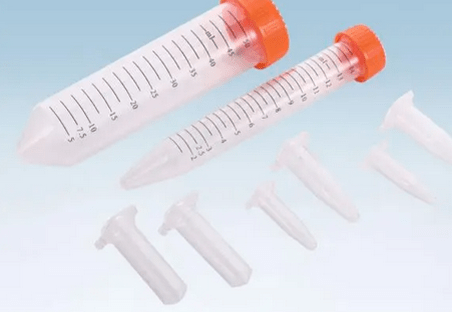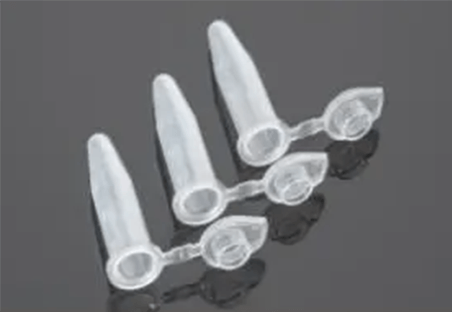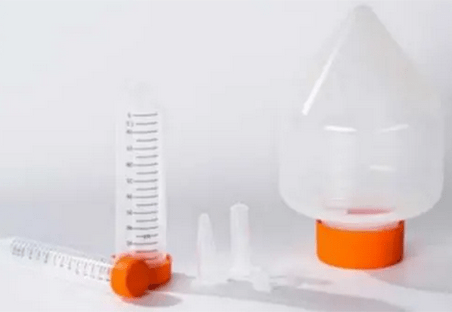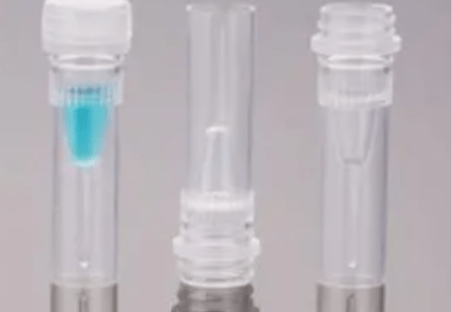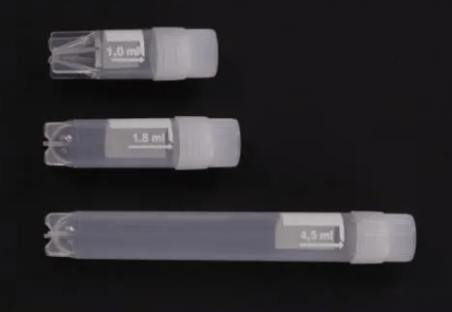In the realm of laboratory experiments, the selection of appropriate vessels is critical for the success and reliability of results. Among the myriad tools at a scientist’s disposal, conical centrifuge tubes and bottles stand as indispensable vessels for the processing, separation, and storage of biological samples, reagents, and solutions. Ranging from micro to milliliters, these vessels accommodate diverse sample volumes and centrifugation speeds. Understanding the types available and how to select the right one is essential for efficient and safe experimentation. In this article, we are exploring the factors influencing the selection of conical centrifuge tubes and bottles, offering some tips for using. By understanding the nuances of tube and bottle selection, researchers can navigate the complexities of experimental design with confidence and precision.

Why Choosing Conical Centrifuge Tubes over Other Centrifugation Vessels?
Conical centrifuge tubes offer several advantages over other centrifugation vessels like round-bottom tubes, particularly in specific applications. Here’s a breakdown of their key strengths:
- Efficient Pellet Formation:
- Shape-driven: The conical shape promotes efficient pelleting of denser materials closer to the bottom due to the converging forces during centrifugation. This allows for easier recovery and minimizes sample loss compared to round-bottom tubes, where pellets can spread out.
- Reduced mixing: The conical design helps minimize convection currents within the sample, further aiding in better separation and clearer pellet formation.
- Sample Recovery:
- Focused pellet: With the pellet concentrated at the bottom, conical tubes enable easier resuspension and retrieval of the desired material compared to round-bottom tubes, where pellets might be more dispersed or stuck to the curved bottom.
- Pipetting ease: The narrow bottom tip facilitates easier and more complete pipetting of the supernatant or resuspended pellet, minimizing sample loss.
- Other Advantages:
- Versatility: Conical tubes come in various sizes and materials, suitable for various centrifugation speeds, sample volumes, and chemical applications.
- Stackability: The conical shape allows for stable stacking of tubes, saving space and improving organization in the centrifuge rotor.
- Cost-effectiveness: Conical tubes are generally more affordable than some specialized centrifugation vessels.
In conclusion, choosing between conical and round-bottom tubes depends on your specific needs. Conical tubes excel in applications requiring efficient pelleting, easy sample recovery, and cost-effectiveness, while round-bottom tubes might be better suited for situations demanding larger sample volumes or minimal sample disturbance.
Types of Conical Centrifuge Tubes and Bottles
Conical centrifuge tubes and bottles come in a diverse array of types, each tailored for specific applications and needs. Here’s an overview of the common varieties:
By Material:
- Polypropylene (PP): The most common and versatile material, offering good chemical resistance, affordability, and autoclavability. Suitable for various applications, including cell culture, protein purification, and nucleic acid isolation.
- Polycarbonate (PC): Offers higher clarity and strength than PP, making it ideal for visualizing samples and enduring high centrifugation speeds. However, it has limited chemical resistance and cannot be autoclaved.
- Polystyrene (PS): More economical than other options but less chemically resistant and not autoclavable. Primarily used for non-critical applications or short-term storage.
- Glass: Offers excellent chemical resistance, inertness, and high clarity for precise observation. However, it’s more fragile and expensive than plastic options.
By Volume:
- Microcentrifuge tubes: Microcentrifuge tubes are small-capacity tubes typically used in molecular biology, biochemistry, and microbiology applications. They typically range from 0.2ml to 2.0ml and are designed to withstand high centrifugal forces generated by microcentrifuges, ideal for small sample volumes and PCR applications. Microcentrifuge tubes are often made from polypropylene for chemical resistance and durability.
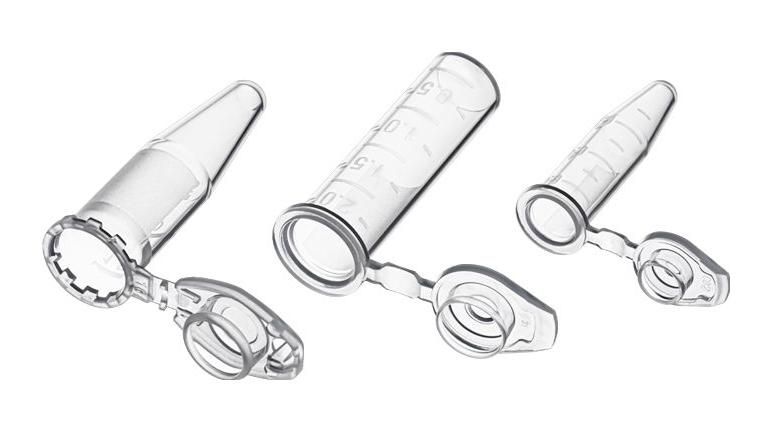
- Standard centrifuge tubes: The most commonly used type, with capacities ranging from 15ml to 50ml. They are commonly used in molecular biology, cell culture, and biotechnology laboratories for various applications including pelleting, isolation, and purification of biomolecules. 15 ml conical centrifuge tubes are compatible with standard centrifuge rotors and 50 mL conical centrifuge tubes are compatible with high-speed centrifugation and are typically made from polypropylene for chemical resistance and strength.

- Large-volume centrifuge bottles: Hold larger volumes, from 250ml to 1000ml, used for large-scale preparations or pelleting big samples. 250 mL conical centrifuge bottles are commonly used in industrial and research laboratories for applications such as cell culture, fermentation, and large-scale purification processes. 500 mL conical centrifuge bottles are commonly used in industrial bioprocessing, pharmaceutical manufacturing, and large-scale research applications. They both are made from durable materials such as polycarbonate or polypropylene and are designed to withstand high-speed centrifugation.

By Design Features:
- Self-standing: These tubes have a flat base, allowing them to stand upright on the bench without a rack for convenient handling.
- Graduated: Feature printed markings for easy measurement of sample volume directly within the tube.
- Screw-cap: Offer a secure closure with a screw cap, preventing leaks and ensuring sample integrity.
- Snap-cap: Provide a quick and easy closure with a snap-on cap, suitable for frequent opening and closing.
- Sterile: Pre-sterilized tubes are available for applications requiring aseptic conditions.
Here’s a comparative table outlining the key features of different types of centrifuge tubes and bottles:
| Classification | Feature | Volume Range | Special Features | Advantages | Disadvantages |
| Material | Polypropylene (PP) | 0.2ml – 1000ml | Most common, affordable, autoclavable | Versatile, good chemical resistance | Lower clarity than some materials |
| Polycarbonate (PC) | 0.2ml – 50ml | High clarity, strong | Excellent clarity, high speed tolerance | Limited chemical resistance, not autoclavable | |
| Polystyrene (PS) | 0.2ml – 50ml | Economical | Low cost | Lower chemical resistance, not autoclavable | |
| Glass | 15ml – 1000ml | Excellent chemical resistance, inert | High clarity, good for visualization | Fragile, expensive | |
| Volume | Microcentrifuge Tubes | 0.2ml – 2.0ml | Tiny for small sample volumes | Small sample volumes, PCR | Limited volume |
| Standard Centrifuge Tubes | 15ml – 50ml | Most common | Diverse applications | Medium volume | |
| Large-volume Centrifuge Tubes | 250ml – 1000ml | Large-volume for big samples | Large-scale preparations, big samples | Large volume, bulky | |
| Design Features | Self-standing | Any volume | Flat base | Convenient handling | Less stable than other designs |
| Graduated | Any volume | Printed markings | Easy volume measurement | May affect clarity slightly | |
| Screw-cap | Any volume | Secure closure | Leak-proof, good for long storage | Slower opening/closing | |
| Snap-cap | Any volume | Quick closure | Convenient for frequent use | Less secure than screw-cap | |
| Sterile | Any volume | Pre-sterilized | Aseptic conditions | May be more expensive |
Each type of conical centrifuge tube or bottle offers unique advantages and is selected based on factors such as sample volume, centrifugation speed, compatibility with the centrifuge rotor, and experimental requirements.

How to Select the Right Conical Centrifuge Tubes and Bottles for Your Experiment?
Choosing the right conical centrifuge tubes and bottles for your experiment involves carefully considering several factors. Here’s a step-by-step guide to help you make the best selection:
1. Define your experiment:
- What are you centrifuging? (Cells, proteins, nucleic acids, etc.)
- What is the desired outcome? (Pellet formation, supernatant clarification, etc.)
- What is the sample volume?
- What are the centrifugation speeds and forces involved?
2. Consider material properties:
- Chemical compatibility: Ensure the tube material is resistant to the solvents and chemicals you’ll be using.
- Temperature tolerance: Choose a material that can withstand the desired centrifugation temperature, especially for high-speed applications.
- Strength and clarity: Polycarbonate offers high clarity and strength, while polypropylene is more affordable and autoclavable. Glass provides excellent chemical resistance and inertness but is fragile.
3. Choose the right volume:
- Select a tube volume that comfortably accommodates your sample without overfilling or leaving excessive empty space.
- Consider the minimum volume required for proper pelleting and efficient sample recovery.
4. Design features for your needs:
- Self-standing tubes: Convenient for handling but might be less stable.
- Graduated tubes: Allow for easy volume measurement directly in the tube.
- Screw-cap tubes: Offer the most secure closure, ideal for long-term storage or volatile samples.
- Snap-cap tubes: Provide quick and easy closure, suitable for frequent opening and closing.
- Sterile tubes: Essential for applications requiring aseptic conditions.
5. Additional factors:
- Budget: Consider the cost of different materials and features.
- Waste management: If applicable, choose tubes made from recyclable materials.
- Personal preference: Consider factors like ease of handling and labeling.
Here are some additional tips:
- Consult the manufacturer’s specifications for detailed information on each tube type’s properties and limitations.
- If unsure, opt for a versatile material like polypropylene.
- For critical experiments, consider using sterile, graduated tubes with secure closures.
- Don’t hesitate to seek guidance from your lab consumable supplier for specific recommendations.
Conclusion
In the realm of scientific inquiry, meticulous attention to detail is the cornerstone of progress. When we are choosing conical centrifuge tubes and bottles, each decision shapes the trajectory of experimentation, from the delicate balance between micro and milliliters to the nuanced interplay of material properties and functionality. If you are looking for the conical centrifuge tubes and bottles, it’s better to buy from a professional centrifuge tube supplier. By carefully considering the factors above, you can ensure your precious samples are safe, secure, and ultimately, lead you to the results you seek.
